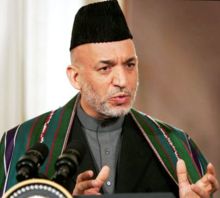Afghan president accepts runoff vote; UN seeks to fire 200 officials
Wednesday, October 21, 2009

Image: Paul Morse.
Afghan President Hamid Karzai agreed yesterday to a runoff vote with former Foreign Minister Abdullah Abdullah on November 7, after much international pressure, following a report on voting irregularities. Secretary General Ban Ki-moon has said that the United Nations has requested that the Independent Election Commission (IEC) replace 200 of its officials in order to avoid a repeat incident. President Karzai said it was "time to move forward to stability and national unity".
International reaction and involvement
Western leaders commended President Karzai for agreeing to the runoff. "While this election could have remained unresolved, to the detriment of the country, President Karzai's constructive actions established an important precedent for Afghanistan's new democracy,' said United States President Barack Obama. "The Afghan Constitution and laws are strengthened by his decision, which is in the best interests of the Afghan people."
United Kingdom Prime Minister Gordon Brown also commended Mr Karzai's "statesmanlike behaviour", whilst the European Union Special Representative Ettore Sequi reserved his congratulations for the Afghan people.
US Senator John Kerry is reported to have played a key role. In an interview with The New York Times, he said he told the Afghan leader about his experiences during his 2004 presidential election loss to former US President George W. Bush, when there were questions about some ballots that helped decide the outcome.
High levels of fraud
UN officials say investigators found that 200 of the 380 district election chiefs in August's presidential vote were linked to polling irregularities or fraud. European Union observers believe that up to one in four of the votes were in doubt, and officials from the UN-backed Electoral Complaints Commission (ECC) discounted ballots from 210 polling stations.
Readiness for runoff vote
The UN mission in Kabul says that the removal and replacement of the officials had already started before yesterday's announcement of the runoff vote. Secretary General Ban said the UN had learned "quite a painful lesson" from the fraud. "We realised that it was quite difficult for a young democracy to stand on its own, even with strong international assistance, particularly by the UN," he said. "We will also try to visit all the polling stations to make sure that no such fraud can happen," he added.
Grant Kippen, head of the ECC, said he believed the IEC is ready. "They've been planning for this for a number of months now," he said. "My understanding is that they're prepared. They have ballots printed, they have them here in Kabul along with the indelible ink and the polling station kits. So now the effort begins to get those materials distributed to the provinces and ready for the November 7 vote."
There are nevertheless difficulties ahead in implementing the runoff vote. Afghanistan has many large, mountainous regions, and some areas will become inaccessible due to snowfall. There are also security risks where militant factions still operate.
Widespread problem
US Defense Secretary Robert Gates welcomed the announcement of the runoff vote, but said Afghanistan's struggles with corruption are larger than one election. During a visit to Japan, he said that there is a "need to be realistic" that tackling issues of corruption and governance in Afghanistan are an ongoing "evolutionary process."
"Clearly, having the run-off, getting it behind us and then moving forward is very important," he said. "But I think we need to be realistic that the issues of corruption and governance that we are trying to work with the Afghan government on are not going to be solved simply by the outcome of the presidential election. This is going to be a work in progress, an evolutionary process, and we need to be realistic on that."
Sources
- "UN Seeks to Fire 200 Afghan Election Officials Before Runoff Vote" — VOA News, October 21, 2009
- "Afghan poll fraud officials fired" — BBC News Online, October 21, 2009
- "Poll body under scrutiny to avoid repeat flaws in run-off" — France 24, October 21, 2009
- "Winter election looms as Hamid Karzai bows to pressure" — Times Online, October 21, 2009
- Toby Harnden. "Barack Obama's Afghan troop decision delay provokes anger at Pentagon" — Telegraph.co.uk, October 21, 2009

